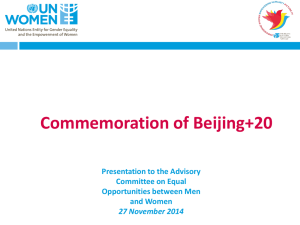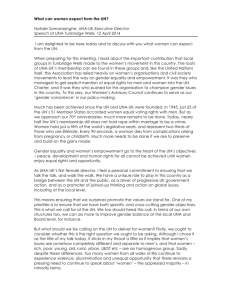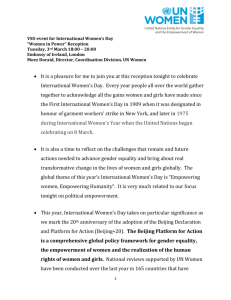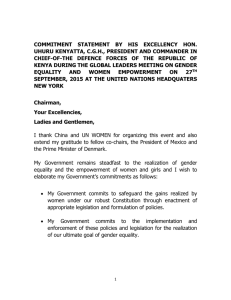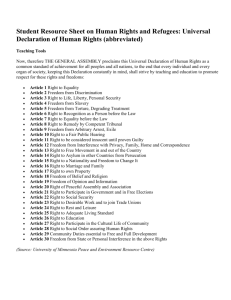UN Women Communications Strategy Power Point Presentation
advertisement
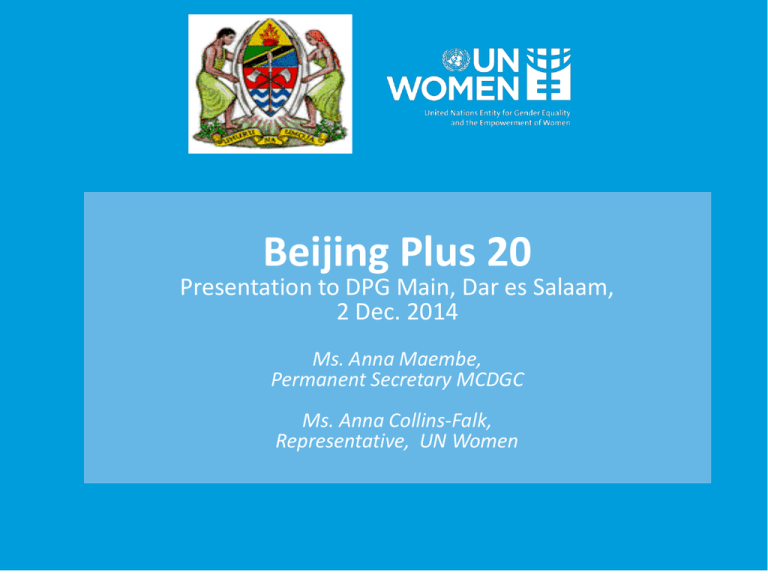
Beijing Plus 20 Presentation to DPG Main, Dar es Salaam, 2 Dec. 2014 Ms. Anna Maembe, Permanent Secretary MCDGC Ms. Anna Collins-Falk, Representative, UN Women The Beijing Journey • • • The Fourth World Conference on Women held in Beijing in 1995 resulted in the adoption of the Beijing Declaration and Platform for Action (BDPfA) by 189 Member States of the United Nations. It has 12 Critical Areas of Concern to guide the mainstreaming of gender in policies, strategies and programmes. The Declaration calls upon Member States to commit to the advancement of the goals of equality, development and peace for all women while reaffirming the principal that the rights of women and girls are an inalienable, integral and indivisible part of universal human rights. Regular Reviews • The accountability framework for the Beijing Declaration and Platform for Action requires member States of the United Nations to meet on a five-yearly basis to review their implementation, at both regional and global levels, of the Platform for Action • The BPFA 12 critical areas of concern which constitute barriers for the advancement of women, and identified a range of actions that governments, the United Nations, and civil society groups, should take to make women’s human rights a reality • Tanzania submitted its four review reports and the B+20 was reviewed in Addis in November 2014. The BPfA The12 critical areas of concern in the Beijing Platform for Action include: 1. Women and Poverty 2. Education and Training of Women 3. Women and Health 4. Violence Against Women 5. Women and Armed Conflict 6. Women and the Economy 7. Women in Power and Decision Making 8. Institutional Mech. for the Advancement of Women 9. Human Rights of Women 10. Women and Media 11. Women and the Environment 12. The Girl Child Global and Regional Normative Frameworks UN frameworks and instruments, international conferences and the CEDAW, provides the basis for realizing equality between women and men. Backed by regional documents, instruments and processes, including: • The African Charter on Human and Peoples’ Rights adopted in 2003 • Protocol to the African Charter on Human and Peoples’ Rights on the Rights of Women in Africa: The adoption of the Women’s Rights Protocol sought to address the ACHPR’s omission of women’s rights. Of the 53 AU member countries, 49 have signed the protocol. • The Solemn Declaration on Gender Equality in Africa (SDGEA) 2004: SDGEA is considered as a reporting framework and was adopted by AU heads of state and government s at their July 2004 Summit • African Women’s Decade 2010-2020: The declaration of the Women’s Decade (2010–2020) provides a road map for the realization of the objectives for the Decade. The theme of the Decade is ‘Grassroots Approach to Gender Equality and Women’s Empowerment’, emphasizing a bottom-up approach to development. 9th African Regional Conference on Women • • • • African ministers recommitted to implementing Beijing Platform for Action Adopted a Declaration calling for governments to achieve gender equality by 2030, as spelled out in the Agenda 2063 Noted remaining challenges to implementing BPfA, compounded by emerging issues, such as climate change, terrorism, conflicts, global economic and financial crises and increasing inequality. Called for African governments to allocate adequate resources by adopting appropriate strategies, including gender budgeting; to accelerate the implementation of the remaining gaps from the BPfA through strengthened domestic resource mobilization and allocation to women’s needs. AUC: 2015 the Year of Women’s Empowerment • Called on international partners, incl. the UN, to provide technical and financial support, and the space and resources for the women’s movement in Africa to play their critical role of providing services to women and girls and demanding accountability for the implementation of agreed upon national, regional and global commitments on gender equality and women’s empowerment. • Welcomed the decision of the Assembly of Heads of State and Government of the AUC declaring the year 2015 as the “Year of Women’s Empowerment and Development towards realizing Africa’s Agenda 2063”. A more transformative framework……… • Africa has to come up with a more transformative framework, which will accelerate the desired change in the lives of women and girls, with a focus on investing in women’s education, health, property rights, access to and control over financial resources, knowledge and information. • Today we have a lot of evidence that confirms what feminist researchers and development practitioners have argued for the last 30 years: that the contribution women make to development is of paramount importance and unless development benefits women, it will not benefit the rest of the society. Outcome Document Beijing Plus 20 Review • Africa has come a long way as a region in addressing gender inequalities and have made gains along the way. • Mindful of the persisting challenges and bottlenecks to achieving full gender equality on the continent • Committed to continue working with you to take advantage of the global processes-SDGs, post 2015 development agenda, CSW 2015 etc in ensuring sound frameworks for the implementation of gender equality goals • Finally, achieving “gender equality” and ending discrimination against women and girls requires the involvement of men and boys, families, communities and nations and the international community. Analysis of Beijing reviews Success in enhancing the capabilities of women in the social sectors (education and health); Progress in enhancing women’s voice and agency in political power and decisionmaking; Analysis of Beijing reviews……ctd Very limited progress in pulling women out of poverty due to inadequate and ineffective provision of economic opportunities Beijing Plus 20 in Tanzania. Snapshot of Progress in Tanzania • Strategies, Policies, plans and programmes gender responsive: Vision 2025, MKUKUTA, MKUZA, Gender Policy (2000),Education, Health, and others • Ratified international and regional instruments on equality and human rights to promote gender equality. • Gender parity achieved in primary education, doing well with secondary (challenge in tertiary -dropouts due t0 pregnancy, early marriage, etc-; few girls pursuing STEM • Financing for GEWE– VICOBA, SACCOS, a few banks. • More women in SMEs • Women in decision making (36% in parliament, judges, RCs and DCs and many more high level posts along with more women in media Snapshot of Progress in Tanzania • Sectoral awareness on gender equality and women’s empowerment although not enough • Done well in reducing maternal mortality rate (but still high) • Collaboration btn all players (Govt, CSOs, partly private sector and DPs) increased and more support for programmes addressing GEWE • Gender Mainstreaming Working Group on Macro Policy developed Gender mainstreaming Guidelines for BRN and Evidence Based Statistics and Analysis – Country Gender Profile Achievements cont. Coalition on VAWG and “sextortion” engaging in national campaign and advocacy through police, judiciary and CSOs. . Snapshot of Challenges in Tanzania • Women’s economic empowerment,( esp. in access to and ownership of resources including land) • High prevalence of Violence against Women and Girls; • Lack of investment in social protection impacting negatively on women and other vulnerable groups; • Limited financing for gender equality and women’s empowerment; • Gender dimensions of climate change and weakness in health systems to respond to calamities • Inadequate data and statistics (incl gender analysis) • Ineffective Implementation of legal and normative frameworks by institutions on women’s human rights due to existence of multiplicity of laws ( religious, customary and statutory laws) • Failure to move women into formal employment and their continued shouldering of the burden of care. Strategies Key strategies identified include: structural transformation (opportunities in constitutional review, review of laws, seize emerging opportunities, gas, mining and others Mainstreaming gender in all sectors – need to strategise during budget guidelines preparation with a gender lens – DPS as partners help gender mainstreaming with MoF, Planning Commission, and all sectors), MCDGC to monitor how this is done and document. Analysis and financing… Gender Budget Statements. women’s work in key productive sectors (i.e. agriculture) and Climate change affecting more women and eroding the achievements so far NEED DPG Main SUPPORT Strategies • Being strategic in influencing ongoing processes such as SDGs, AU Summit 2015, CSW 2015, and the Post 2015 Development Agenda. • Identifying bold interventions that ensures tangible sustainable results that will benefit ordinary women at the local levels – financing for gender equality eg use of mobile phones (ICT) to access markets, medical services even education for rural women/girls • Improving sanitation for girls in schools. • Stakeholders on GEWE should take advantage of the opportunities to address the challenges and gaps identified including financing for gender equality to ensure that NGM is fully resourced not only with funds but also with capacity for monitoring and coordination • MCDGC has the mandate to coordinate Gender Mainstreaming through GMWG-MP . Strategies • Sector GFPs are motivated, GMWG-MP doing a good job – policy dialogues, engaging in BRN (guideline for gender mainstreaming developed and distributed, now , developing the Tanzania Country Gender Profile as evidence base for policy and advocacy • Capacity for GFPs and NGM/NWM is needed • DPs can facilitate by “putting on a gender lens” in insisting on gender analysis and supporting resources allocation and monitoring through the PAFs and PER and other mechanisms to ensure financing for gender equality in support of gender equality results Upcoming Opportunities • International Women’s Day: will be celebrated Nationally in Morogoro Region from 3rd -8th March 2015; ( the 20 years of Beijing will be further assessed). • Big national symposium to critique what has been done, achievements etc. • Will be published into a book (knowledgebase) • Well researched papers by academicians, case studies by farmers and pastoralists will be showcased • The event will involve Govt, CSOs private sector, farmers and pastoralists, businesswomen etc • 59th CSW - from 9th-20th March 2015 to mark 20th Anniversary of Beijing; Review MDGs and Develop the Post 2015 Development Agenda and the SDGs. • Tz needs to showcase at CSW 59 (March 2015) (cross border trade – tbd) FOCUS: Women’s Economic Empowerment Platform leaders from nine border posts and Tanzania Women Chambers of Commerce members come together to develop platform membership guidelines for cross border traders. F Asanteni sana Thank you. Beyond lipservice! http://www.uneca.org/beijing-plus-20
